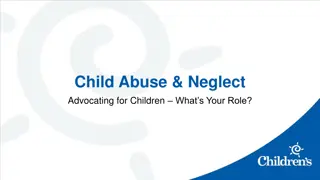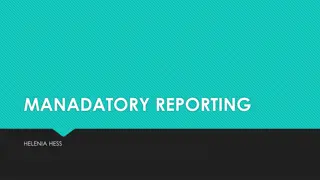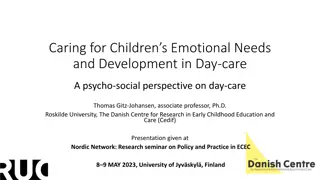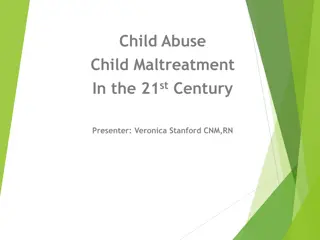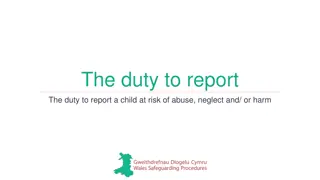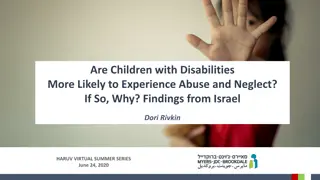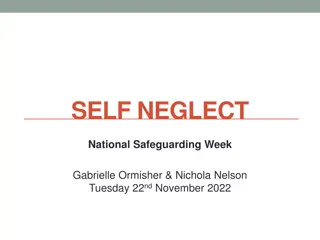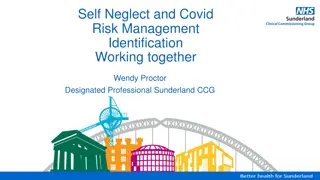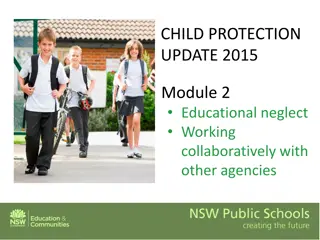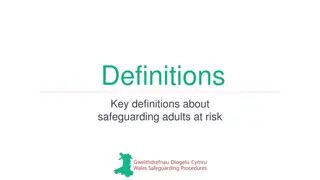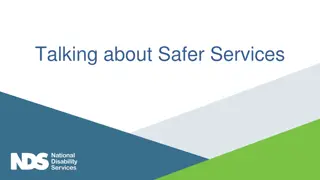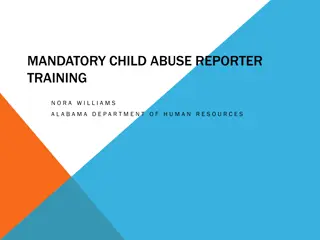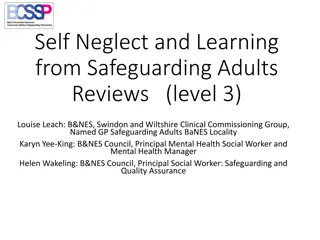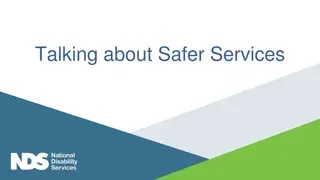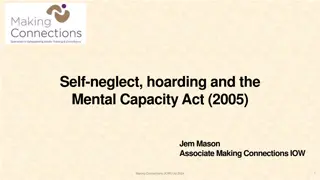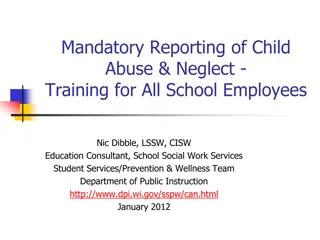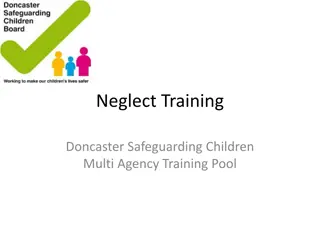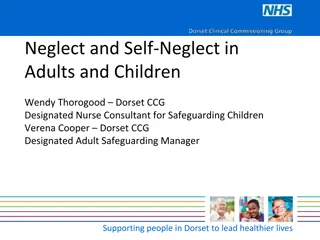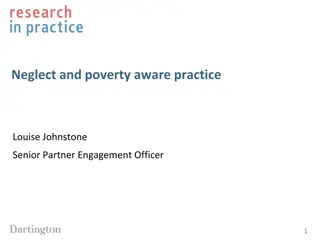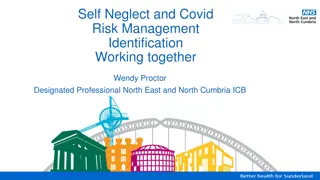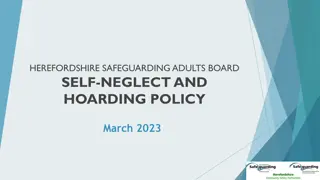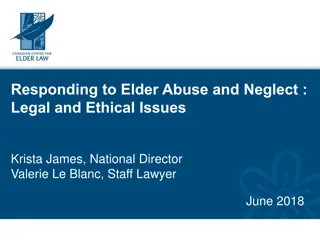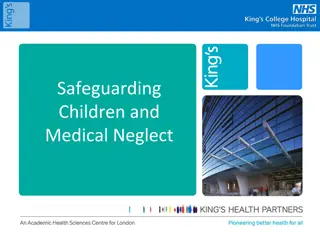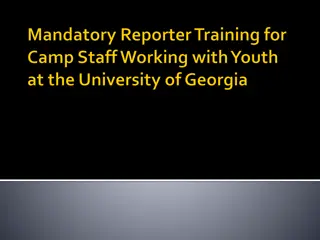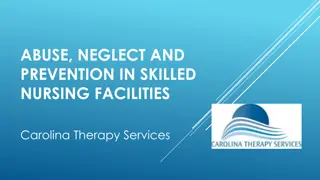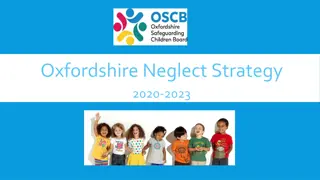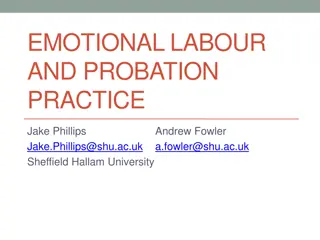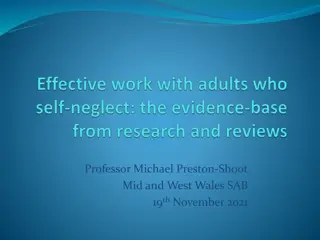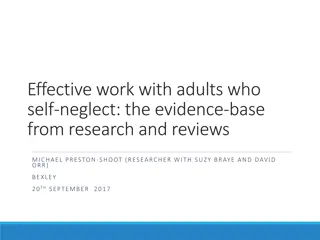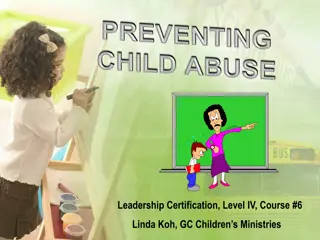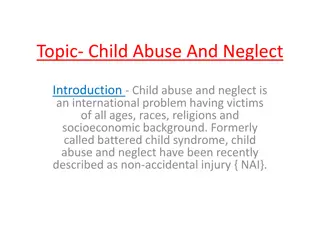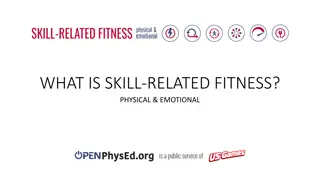Educational Neglect
Explore the concept of educational neglect, responsibilities for ensuring a suitable education, and the United Nations Convention on the Rights of the Child pertaining to education. Topics include school attendance, children missing education, home education, and the role of various parties like loc
0 views • 13 slides
Advocating Against Child Abuse and Neglect: Your Essential Role
Understanding the importance of advocating for children facing abuse and neglect is crucial for all individuals, regardless of their position. Learning about child abuse, recognizing signs, mandatory reporting laws, and knowing how to take action are essential components discussed in this informativ
0 views • 22 slides
Mandatory Reporting Guidelines for Suspected Child Abuse/Neglect
Understanding mandatory reporting requirements for child abuse and neglect is crucial for various professionals and individuals working with children. This content emphasizes the legal obligations and procedures involved in reporting suspected cases, ensuring immunity for those reporting in good fai
1 views • 6 slides
Understanding Children's Emotional Development in Daycare from a Psycho-Social Perspective
Scientific evidence emphasizes the early onset of emotional development and its profound impact on lifelong outcomes. The quality of childcare processes plays a pivotal role in shaping children's social-emotional development, highlighting the importance of nurturing emotional relationships in daycar
0 views • 10 slides
Understanding Child Abuse and Neglect in the 21st Century
Child abuse and neglect are serious issues affecting millions of children worldwide. This course by presenter Veronica Stanford sheds light on identifying, reporting, and preventing various forms of maltreatment, including physical abuse, sexual exploitation, and neglect. The content delves into the
1 views • 30 slides
Understanding the Duty to Report Child Abuse and Neglect
The duty to report concerns of child abuse, neglect, and harm is essential for practitioners and individuals coming into contact with children. This responsibility, whether statutory or non-statutory, requires prompt action to safeguard children at risk. Recognizing and acting on suspicions of abuse
0 views • 20 slides
Children with Disabilities: Vulnerability to Abuse and Neglect
Children with disabilities are at a significantly higher risk of experiencing abuse and neglect compared to their non-disabled peers. Incidents such as criminal neglect, sexual abuse, and maltreatment have been reported, highlighting the urgent need for prevention programs and tailored interventions
0 views • 18 slides
Understanding Self-Neglect in Vulnerable Adults - Case Study
A case study detailing an individual, diagnosed with various mental health conditions, experiencing self-neglect and high risks, such as vulnerability to harm, self-harm, alcohol misuse, and homelessness. Despite past efforts, including supported accommodation, the individual faces multiple challeng
1 views • 16 slides
Understanding Self-Neglect in Adults: Risk Management and Complex Factors
Self-neglect involves neglecting personal care and surroundings, posing risks to health and well-being. Legislation and guidance provide frameworks to address self-neglect, which can manifest in various forms such as lack of self-care and refusal of services. Professionals must consider the complex
0 views • 23 slides
Understanding Educational Neglect and Collaborative Interventions in Child Protection
Attending school regularly is crucial for children's development. Educational neglect, such as constant lateness or irregular attendance, can have serious repercussions. Schools and other agencies must work together to address and prevent educational neglect through early identification, communicati
1 views • 19 slides
Understanding Safeguarding Adults at Risk
Safeguarding adults at risk involves preventing, protecting, and promoting well-being to individuals aged 18 years or over who are experiencing or at risk of abuse or neglect. It emphasizes early intervention, recognizing signs of abuse, and respecting the individual's right to self-determination. R
0 views • 13 slides
Safeguarding Adults: An Introduction to Adult Social Care and Responsibilities
This presentation provides an overview of eligibility criteria for adult social care and its link to adult safeguarding. It covers understanding adult safeguarding and abuse, recognizing types of abuse, and making safeguarding referrals. The Care Act 2014 sets out eligibility criteria for adult soci
0 views • 23 slides
Understanding Emotional Intelligence: Key Principles and Skills
Emotional intelligence, as presented by David Taylor, is crucial in perceiving, understanding, and managing emotions in oneself and others. It plays a vital role in professional and personal relationships by enhancing emotional awareness, recognition, and management. The principles of emotional inte
1 views • 22 slides
Changes to Joint Multi-Agency Safeguarding Adults Policy and Procedures
The changes to the joint multi-agency safeguarding adults policy and procedures in West Yorkshire, North Yorkshire, and the City of York are aimed at enhancing safeguarding practices, implementing new online pathways, and providing resources for staff updates. The focus is on safeguarding adults' ri
1 views • 74 slides
Exploring Safer Services and Preventing Abuse and Neglect
Today, we delve into the importance of promoting safer services and preventing abuse and neglect. We examine the underlying causes of accidental, deliberate, and systemic abuse, emphasizing the concepts of dignity of risk, duty of care, and Supported Decision Making. Reflecting on current practices,
11 views • 20 slides
Mandatory Child Abuse Reporter Training Guidelines
Understand the legal definitions and reporting requirements for child abuse and neglect in Alabama. Learn about different forms of child abuse, including physical, sexual, and neglect. Recognize the signs of abuse and the responsibilities of mandatory reporters. Discover the types of professionals r
2 views • 17 slides
Understanding Self-Neglect and Safeguarding in Adults
Self-neglect in adults involves a lack of self-care, neglect of personal hygiene, health, and domestic environment, as well as refusal of services. It can stem from physical or mental health issues, past trauma, hoarding as a coping mechanism,and low self-esteem. Learning about policies, Mental Capa
7 views • 39 slides
Understanding Abuse and Neglect: Exploring Safer Practices
Delve into the complex issues of abuse and neglect, uncovering the various ways they can occur - whether accidentally, deliberately, or systemically. Discover the importance of concepts like Dignity of Risk, Duty of Care, and Supported Decision Making in safeguarding individuals. Reflect on organiza
0 views • 20 slides
Understanding Self-Neglect, Hoarding, and the Mental Capacity Act (2005)
Self-neglect and hoarding are complex issues often intertwined with mental capacity challenges. The Mental Capacity Act (2005) outlines capacity assessments, decision-making criteria, and challenges faced by professionals in safeguarding individuals. Recognizing the need for trauma-informed care in
1 views • 16 slides
Mandatory Reporting of Child Abuse and Neglect in Schools: Training Overview
This training overview provides crucial information on recognizing and reporting child abuse and neglect in a school setting. Topics covered include the definition of neglect, identifying caregivers, warning signs, and reporting protocols. By watching this webcast, school employees can fulfill the l
2 views • 46 slides
Tragic Cases of Child Abuse and Neglect in the UK
The cases of Victoria Climbié, Child BR, Child C, and Child H shed light on the devastating effects of child abuse and neglect in the UK. Victoria suffered 128 injuries before her death due to abuse and neglect. Child BR's death was a result of complications from a chronic health condition, highlig
0 views • 11 slides
Safeguarding Children Training on Neglect and Abuse
Explore the critical aspects of neglect in safeguarding children, including defining neglect, its impact on childhood development, identifying types of neglect, lessons from serious case reviews, and assessment and intervention strategies. Engage in discussions, establish ground rules, and understan
1 views • 74 slides
Addressing Neglect and Self-Neglect in a Complex Family Setting
In a poignant tale of neglect and self-neglect, a family comprising a bed-bound grandmother, a daughter with learning disabilities, and a history of abuse navigates challenging dynamics. With the intervention of healthcare professionals and a fresh perspective, issues of hoarding, sexualized behavio
1 views • 14 slides
Understanding Neglect and Poverty in Practice
Explore the multi-dimensional concept of neglect, its impact on children's wellbeing, difficulties in assessment, importance of understanding individual stories, and available resources for support in addressing neglect within poverty contexts. Reflect on the crucial role professionals play in recog
1 views • 19 slides
Understanding Self-Neglect and Covid Risk Management in Safeguarding
Self-neglect is a complex issue that involves neglecting personal care and environment, posing health risks. Legislation and guidance, lack of standard definition, and factors contributing to self-neglect are explored, emphasizing the importance of a comprehensive understanding in safeguarding vulne
0 views • 23 slides
Herefordshire Safeguarding Adults Board Self-Neglect and Hoarding Policy Overview
The policy addresses self-neglect and hoarding behaviors, emphasizing the broad spectrum it covers, including lack of self-care and failure to seek assistance for critical needs. It highlights the complexity faced by practitioners in balancing autonomy and duty of care. The background data reflects
1 views • 15 slides
Understanding and Addressing Elder Abuse and Neglect: Legal and Ethical Perspectives
Explore legal and ethical considerations related to elder abuse and neglect in Canada, presented by Krista James and Valerie Le Blanc from the Canadian Centre for Elder Law. Discover definitions, laws, and resources to combat mistreatment of older adults, including insights on various types of abuse
0 views • 51 slides
Understanding Child Neglect and Medical Neglect: A Comprehensive Overview
Child neglect, including medical neglect, is a serious form of child abuse that involves failing to meet a child's basic needs, such as proper healthcare. This article delves into the definitions, examples, and scenarios of neglect, shedding light on the devastating impact it can have on children's
0 views • 17 slides
Recognizing and Reporting Child Abuse in Georgia: A Guide for Mandated Reporters
Designed to help Georgia mandated reporters identify signs of child abuse and neglect, understand legal obligations for reporting, and know how to make a report. Mandated reporters play a critical role in safeguarding children's well-being by reporting suspicions of abuse and neglect to the proper a
0 views • 41 slides
Preventing Abuse and Neglect in Skilled Nursing Facilities
Carolina Therapy Services emphasizes the prevention of abuse, neglect, and mistreatment in skilled nursing facilities. They provide medically related services to prioritize the physical, mental, and psychosocial well-being of residents while upholding their dignity and respect. The organization stri
0 views • 25 slides
Oxfordshire Neglect Strategy 2020-2023 Summary
The Oxfordshire Neglect Strategy 2020-2023 aims to reduce the impact of neglect on children's well-being by identifying it early within families. The strategy emphasizes understanding the child's experience, supporting families for change, and intervening early to prevent long-term damage. Feedback
0 views • 7 slides
Understanding Emotional Labour in Probation Practice
Explore the concept of emotional labour in probation practice, highlighting the management of emotions, impact on research and practice, links to burnout, and the role of managerialism and rationality. Delve into emotional work, Chamberlayne's 'emotion work', and feeling rules associated with emotio
0 views • 16 slides
Importance of Emotional Intelligence in Religious Leadership
Religious leaders benefit greatly from high emotional intelligence, leading to better performance, increased staff retention, and a more positive work environment. Emotional intelligence plays a vital role in pastoral ministry, enhancing emotional care for congregants. Educational programs focusing
0 views • 15 slides
Understanding Adult Self-Neglect: Evidence-Based Practices and National Analysis
The evidence base for working with adults who self-neglect reveals key insights from safeguarding adult reviews, emphasizing the prevalence of self-neglect as a form of abuse or neglect. Case reviews highlight system failures and areas for improvement, such as legal literacy and coordination shortco
0 views • 26 slides
Understanding Self-Neglect in Adults: Challenges and Research Insights
This content delves into the complex issue of self-neglect in adults, covering its definition, key challenges, and the research evidence available. It explores the various aspects of self-neglect, including neglect of self-care, domestic environment, and refusal of services. The challenges associate
0 views • 39 slides
Understanding the Tragic Impact of Child Abuse
Child abuse, in its various forms such as physical, emotional, sexual, and neglect, can have lasting detrimental effects on children, including emotional trauma, physical harm, and difficulties in forming relationships. Recognizing the signs and understanding the emotional toll on victims is crucial
0 views • 22 slides
Social-Emotional Health and Resilience of Teachers in East European Countries
This study explores the social-emotional health and resilience of teachers in Latvia, Lithuania, and the Slovak Republic as part of an Erasmus+ project aimed at developing a digital support system to promote their well-being. The interplay between mental health, social-emotional health, and resilien
0 views • 30 slides
Understanding Child Abuse and Neglect: Types, Signs, and Impact
Child abuse and neglect are global issues affecting individuals of all backgrounds. It encompasses various forms such as physical abuse, sexual abuse, neglect, and emotional abuse. Recognizing the signs of abuse is crucial to protect children and provide appropriate intervention. It is essential to
0 views • 31 slides
Understanding Self-Neglect: Ethical Issues and Assessment Tools
Exploring the complexities of self-neglect, this content delves into associated factors, ethical considerations, assessment tools, and measurement techniques. From environmental influences to personal health behaviors, the discussion covers a range of aspects related to self-neglect in vulnerable po
0 views • 13 slides
Understanding Skill-Related Fitness: Physical and Emotional Aspects
Skill-related fitness encompasses both physical and emotional components, such as agility, balance, coordination, power, reaction time, and speed. Physical agility involves quick body movements, while emotional agility relates to positive responses in various situations. Physical balance requires we
0 views • 7 slides

